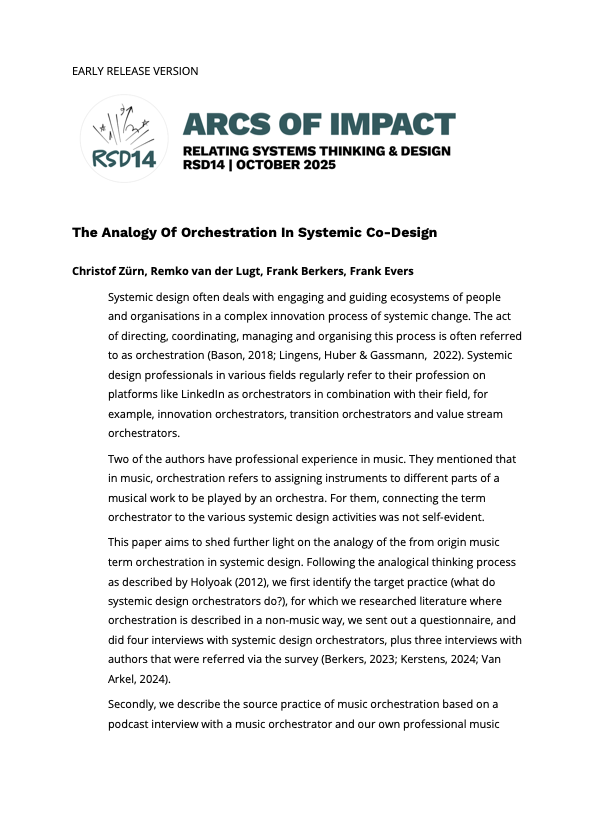Orchestration research paper – early release version

What is orchestration? In the last year I dove into orchestration and what this means in different context. I dedicated different podcast episodes to what people do when they say they are orchestrating. I did research on academic papers, a survey, interviews with experts in the field and dedicated a whole episode with a music orchestrator.
Here is the early release, which has already undergone peer review, update, and is now an Advance Online Publication of the RSD14 conference. Researchers can provide additional input until our presentation at the conference.
As a sneak preview, you can read the paper here.
Read the full abstract of the orchestration paper
Systemic design often deals with engaging and guiding ecosystems of people and organisations in a complex innovation process of systemic change. The act of directing, coordinating, managing and organising this process is often referred to as orchestration (Bason, 2018; Lingens, Huber & Gassmann, 2022). Systemic design professionals in various fields regularly refer to their profession on platforms like LinkedIn as orchestrators in combination with their field, for example, innovation orchestrators, transition orchestrators and value stream orchestrators.
Two of the authors have professional experience in music. They mentioned that in music, orchestration refers to assigning instruments to different parts of a musical work to be played by an orchestra. For them, connecting the term orchestrator to the various systemic design activities was not self-evident.
This paper aims to shed further light on the analogy of the from origin music term orchestration in systemic design. Following the analogical thinking process as described by Holyoak (2012), we first identify the target practice (what do systemic design orchestrators do?), for which we researched literature where orchestration is described in a non-music way, we sent out a questionnaire, and did four interviews with systemic design orchestrators, plus three interviews with authors that were referred via the survey (Berkers, 2023; Kerstens, 2024; Van Arkel, 2024).
Secondly, we describe the source practice of music orchestration based on a podcast interview with a music orchestrator and our own professional music expertise. Finally, we explore the mapping of the source onto the target practice and critically analyse the extent of the fit, as well as what the analogy can teach us about the practice of systemic design orchestrators.
As a first insight, systemic design orchestrators describe their practice as a combination of various roles in music, such as the composer, the arranger, the orchestrator, and the conductor, rather than the role of an orchestrator alone. We give possible next steps to enrich the practice of a non-music orchestrator by diving deeper into the analogy of music beyond classical music and the orchestra.
KEYWORDS: orchestration, systemic design roles, analogies
RSD TOPIC(S): Cases & Practice, Methods & Methodology
Zürn, C., Van der Lugt, R., Berkers, F., & Evers, F. (2025). The Analogy Of Orchestration In Systemic Co-Design. Proceedings of Relating Systems Thinking and Design, RSD14. Advance online publication. https://rsdsymposium.org/systems-design-methodology-new-practice/
PDF full paper download
Music Thinking and orchestration principles
The conclusion of our paper: there is more than just the classical music metaphor that can inspire your systemic co-design. If you want to use the analogy of music and all its possibilities as described in the conclusion, you have to look further into fields like improvisation and more open compositions that can relate to dynamic strategies.
Based on music thinking principles and the above-mentioned research, we are developing different workshop formats in the near future. You might want to check our course overview page for this.
Inspired by this conversation? Take the next step!
The ideas in this podcast are just the beginning. To truly understand how to apply these concepts, join the Music Thinking Masterclass. In this focused 90-minute session, we translate the theory into practice with simple, powerful examples you can use with your team.
